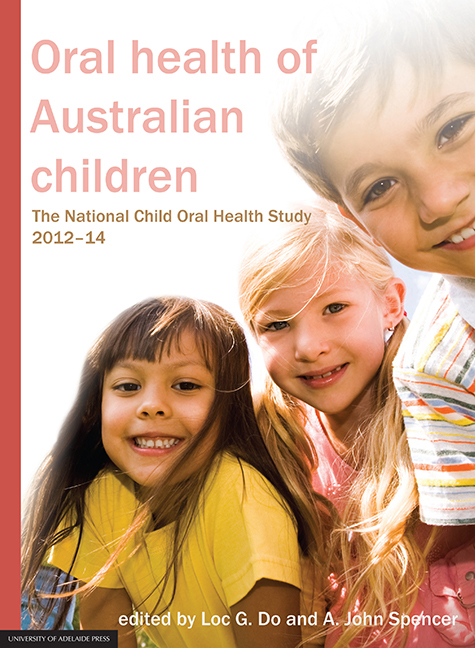Book contents
- Frontmatter
- List of Contributors
- Contents
- Preface
- Executive Summary
- 1 Children's oral health – assessing and improving oral health
- 2 Measuring child oral health and its influences
- 3 Data weighting, consideration and estimation procedures
- 4 Measuring representativeness of the study participants
- 5 Children's oral health status in Australia, 2012–14
- 6 Patterns of dental services use by Australian children
- 7 Australian children's oral health behaviours
- 8 Australian children's general health behaviours
- 9 Social gradients in child oral health
- 10 Oral health status and behaviours of Indigenous Australian children
- 11 Trends in child oral health in Australia
- 12 Interpretation of findings and a way forward to improving oral health and dental care
- 13 Appendix
- State and territory survey personnel
- Symbols
- Abbreviations
- Place names
- Glossary
- List of tables
- List of figures
8 - Australian children's general health behaviours
Published online by Cambridge University Press: 05 September 2017
- Frontmatter
- List of Contributors
- Contents
- Preface
- Executive Summary
- 1 Children's oral health – assessing and improving oral health
- 2 Measuring child oral health and its influences
- 3 Data weighting, consideration and estimation procedures
- 4 Measuring representativeness of the study participants
- 5 Children's oral health status in Australia, 2012–14
- 6 Patterns of dental services use by Australian children
- 7 Australian children's oral health behaviours
- 8 Australian children's general health behaviours
- 9 Social gradients in child oral health
- 10 Oral health status and behaviours of Indigenous Australian children
- 11 Trends in child oral health in Australia
- 12 Interpretation of findings and a way forward to improving oral health and dental care
- 13 Appendix
- State and territory survey personnel
- Symbols
- Abbreviations
- Place names
- Glossary
- List of tables
- List of figures
Summary
Oral health is an integral part of general health and shares a number of common determinants with general health. Those common determinants are mostly related to diet. General health behaviours that affect child oral health centre largely on consumption of water and of drinks and foods containing sugar.
Water consumption can affect oral health in two ways. First, water is a ‘tooth friendly’ drink. Water contains no decay-causing sugar and is generally in the range of acidity that is safe for teeth. Second, water is the main way in which fluoride is accessible to the whole community, irrespective of their individual oral hygiene behaviours. Multiple studies from more than 20 countries have shown that fluoridation reduces dental caries (National Health and Medical Research Council 2007; Rugg-Gunn and Do 2012; Iheozor- Ejiofor et al. 2015), which explains the high priority given to water fluoridation by public health authorities. Water fluoridation provides the greatest benefit to those who can least afford professional dental care (Slade et al. 1995b; Burt 2002). This chapter examines children's consumption of mains and tap water as well as bottled water to assess the extent to which children are likely to receive the benefits to their oral health than can be gained from the fluoridation of reticulated water.
Consumption of sugar is a key risk factor for dental caries (Moynihan and Kelly 2014; Sheiham and James 2014). The impact of sugar on oral health depends in large part on the type, quantity and pattern of consumption. For oral health purposes, sugar that does not occur naturally in milk or in whole fruit or vegetables can contribute to a child's risk of experiencing tooth decay. These sugars are known as ‘free sugars’ and are defined as ‘monosaccharides and disaccharides added to foods and beverages by the manufacturer, cook or consumer, and sugars naturally present in honey, syrups, fruit juices and fruit juice concentrates’ (Rosenberg et al. 2005). Dietary guidelines for Australia recommend that Australians ‘Limit intake of foods and drinks containing added sugars such as confectionary, sugar-sweetened soft drinks and cordials, fruit drinks, vitamin waters, energy and sports drinks’ (National Health and Medical Research Council 2013).
- Type
- Chapter
- Information
- Oral Health of Australian ChildrenThe National Child Oral Health Study 2012-14, pp. 212 - 236Publisher: The University of Adelaide PressPrint publication year: 2016



